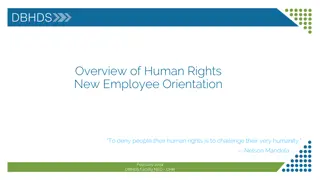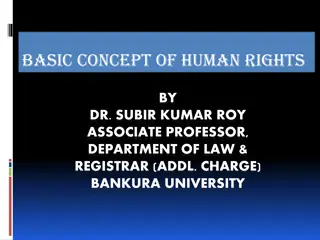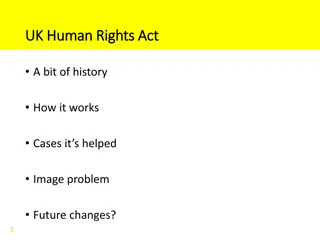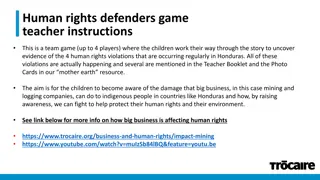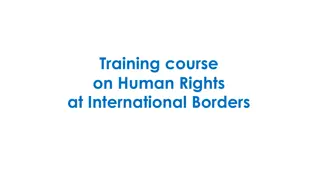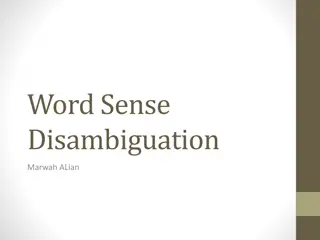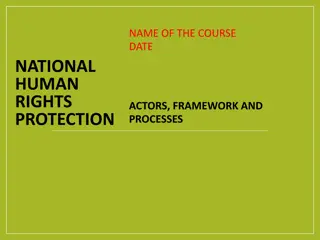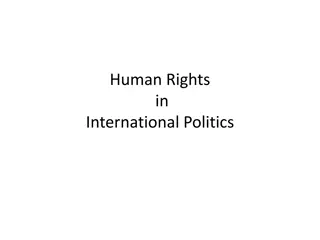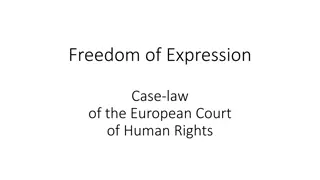Approaches to the study of Human Rights
The Marxist perspective on human rights emphasizes social rights over individual rights, viewing the full realization of self within society. Marx connects bourgeois society with human rights, highlighting how exploitation under capitalism alienates individuals. In contrast, the Third World perspective struggles with Western ideologies on human rights due to diverse socio-cultural contexts. These viewpoints offer unique insights into the complexities of human rights discourse.
Download Presentation

Please find below an Image/Link to download the presentation.
The content on the website is provided AS IS for your information and personal use only. It may not be sold, licensed, or shared on other websites without obtaining consent from the author.If you encounter any issues during the download, it is possible that the publisher has removed the file from their server.
You are allowed to download the files provided on this website for personal or commercial use, subject to the condition that they are used lawfully. All files are the property of their respective owners.
The content on the website is provided AS IS for your information and personal use only. It may not be sold, licensed, or shared on other websites without obtaining consent from the author.
E N D
Presentation Transcript
Approaches to the study of Human Rights MS. MS. USHUS USHUS MOL E U MOL E U DEPARTMENT OF POLITICAL SCIENCE DEPARTMENT OF POLITICAL SCIENCE
MARXIST PERSPECTIVE ON HUMAN MARXIST PERSPECTIVE ON HUMAN RIGHTS RIGHTS The Marxian concept of human rights puts emphasis on social rights rather than individual rights. Dominated by the writings of Marx the argument runs that full realization of an individual s self is possible only within the context of society. In as much as an individual should be concerned with his development, the society has an interest in facilitating the advancement of individuals.
Marx makes a necessary connection between bourgeois society and the notion of human rights. Marx and Engels state that the recognition of the rights of man by the modern state has no other meaning than the recognition of slavery by the ancient state. The individual man in the modern state is linked with other men only by the ties of private interest and unconscious natural necessity.
According to them, every notion of human rights is linked to the competitive struggle that is the hallmark of the bourgeois society and is based on the vision of society and the individual is inherently separate and antagonistic units. Marx points out that the process of bourgeois exploitation holds the entire society at the mercy of market forces. It has an alienating, depersonalizing and dehumanizing impact on man.
Marx believed that the alienation of man could end only with the establishment of communism, when classes have been eliminated, exploitation has ceased and the state has withered away. Class struggle would eventually result in the victory of the working class and it was only then that exploitation would come to an end.
Thus it was the nature of the society that determined the rights and fate of man. It was only in a communistic community that man could be a true individual.
THIRD WORLD PERSPECTIVE ON HUMAN THIRD WORLD PERSPECTIVE ON HUMAN RIGHTS RIGHTS The diverse socio- cultural matrix of developing countries does not permit them to approach the promotion and protection of human rights, in a thorough and unified way. Nor can they be guided by the western style ideology and thinking on protection of human rights. This is on account of three reasons. First, the incorporation of western theories of human rights would amount to the continuation of the colonial heritage.
Secondly, as most of the countries of the third world are in a flux, any kind of incorporation of the human rights regime determined by the west would be either inappropriate or too rigid for these countries. Thirdly, the politicization of human rights has made the ruling elite s of the third world highly suspicious of the western notion of human rights.
The developing countries are faced with tremendous problems of state building, economic reconstruction and regional and sub-regional and ethnic conflicts. These conflicts have potential to threaten the very foundation of the state. Even within the third world, there remains a sharp disagreement on the exact scope and nature of basic human rights and the methodology of the protection of these human rights.
Notwithstanding the core concern shown by international declarations and principles upon protection of human rights, it is difficult to arrive at a concept of human rights in developing countries, which is unanimously acceptable. Nor is there a common framework of action. Faced with immense underdevelopment, combined with foreign and colonial exploitation, poverty and illiteracy, human rights are illusory to large sections of population of these countries. In the process of pursuing socio- economic goals, the developing countries do not show the desired respect to civil and political rights.
Human rights violation is a common feature in most of the developing world where criminalization of politics and lack of accountability has become the order of the day. The brutalization of state power is reflected in the form of state repression with little comfort from the judiciary. Apart from occasional outburst from the judiciary, press, human rights activists and non- governmental organizations, there is no meaningful attempt to formulate a clear cut methodology for the protection of human rights.
Feminist Perspective on Human Rights Both in Vienna at the UN World Conference on Human Rights in 1993 and in Beijing at the UN World Conference on Women in 1995 women's rights were recognized as human rights. For the first time their articulation was accepted as an aspect of international human rights law,
Some years ago women's rights have been catapulted on to the human rights agenda with a speed and determination that has rarely been matched in international law. There are two aspects to this process: first, the attempt to make mainstream human rights responsive to women's concerns; and second, the conceptualization of certain gender-specific violations as human rights violations. These developments have far-reaching implications for the theory and practice of human rights in the United Nations system.
The major turning point, was the UN Conference on Human Rights in Vienna in 1993. The Women's lobby at this Conference had an important impact. Their lobbying effort succeeded. Article 18 of the Vienna Declaration and Programme of Action states :
"The human rights of the girl child are an inalienable, integral and indivisible part of universal human rights. The full and equal participation of women in political, civil, economic, social and cultural life, at the national, regional and international levels, and the eradication of all forms of discrimination on grounds of sex are priority objectives of the international community.. The human rights of women should form an integral part of the United Nations activities, including the promotion of all human rights instruments relating to women .
The striking growth of the women's movement is an important factor in international politics today. It points to the significance international civil society as an initiator of in programmes and mechanisms in the UN system. The Women's lobby is made up of an international coalition of women's groups that have focused their energies and efforts in addressing issues of concern to women. Distinct lobbies have made up the whole. There is the humanitarian women's lobby, which is particularly interested in the problems of violence against women in armed conflict.
A second lobby of African and Asian women have been interested in health problems_and customary practices that are violent towards women. The third lobby of North American, European and Latin American Women has been interested in the issues of domestic violence, rape and sexual harassment. Another lobby that has played a major part in these international initiatives was Women Living under Muslim Laws, which has made a strong case for including the violation of women's rights resulting from religious extremism as a major area of concern.
Finally, a lobby from Southeast and East Asia has dealt with the problem of trafficking and forced prostitution. It has been very active at both the regional and national level,
The discourse on women's rights has transformed the basic tenets of international law. It is often said that civil and political rights are the first generation of human rights; economic, social and cultural rights are the second generation; and group right and the right to self-determination are considered to be the third generation. It may be argued that women's rights are the fourth generation, radically challenging the private-public distinction in international human rights law and pushing for the rights of sexual autonomy .
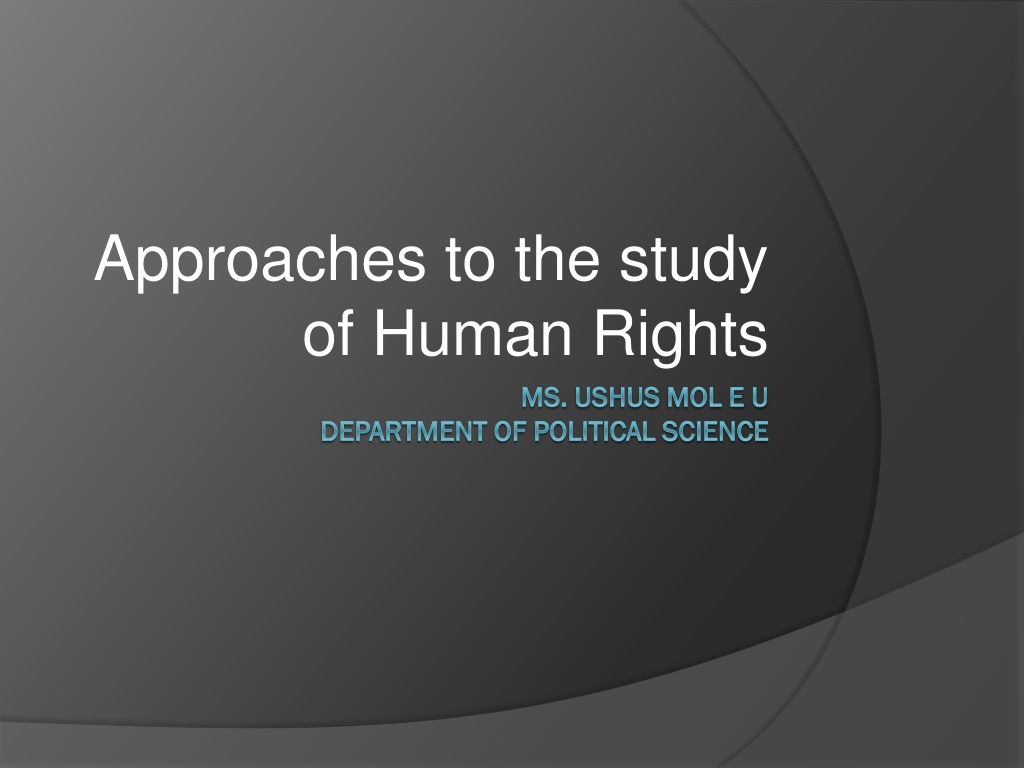
 undefined
undefined



